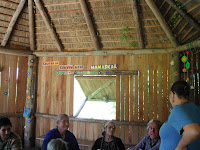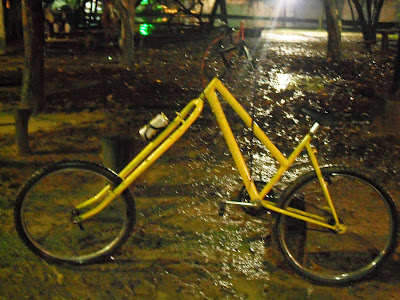
Earlier this week I walked past a home for people with mental illnesses. It was 80 degrees out and the sun was shining. Here the colors are brilliant. Maybe it is the contrast of the sky to the yellowed dirt and gravel roads, the dingy pastel colored former factories or the early model maroon and green VW bugs. The white of the gate enclosing the patio of the home was as white as this digital page. The men and women sitting in the shade there looked muted, not pale, but flat in contrast to their bleached white clothes; and they said little, with the exception of one man who screamed and pushed his brow back with his palm as he eyed the woman in front of him. She didn’t move. She sat in her chair with her mouth open. I don’t think it can be said that she was looking at anything, though she wasn’t blind. On the opposite side of the street a man slowed his car to talk to the prostitute who, despite the heat, did not seem to be sweating. Maybe because I don’t understand most of words around me, the atmospheric sounds that I notice are reduced to the hum of the language, tires on dirt and mud, horse hooves, men working, the footsteps of a little boy who seems to be pursuing a truck. He didn’t say anything. He just sucked the middle two fingers of his right hand as he walked, kicking rocks as he did. I wouldn’t call the place I’m passing an asylum; it is more of a home. It’s roughly 300 yards away from anything. No houses, bus stops, businesses. There’s just this road that I’m walking on. In my head I hear English; nothing interesting, it’s just the incessant narration that follows me through my days. And as walk by I see tableaus: a man yelling at a sitting woman, a woman wiping flour from her hands with a dish towel. She says something that arrests the man’s attention. And in my final steps I watch another man begin to smile as in the background, and more loudly than the traffic or our matron tending to her charges, James Taylor’s voice rises and I hear him singing another song about love. It’s Wednesday again, and my group of elderly women will meet, I think, but I’m not sure where. They’re not in the normal place. They’re not in the room I traveled an hour on foot and an hour by bus to get to, but there is a sign. It’s a sign I can’t read. Something about today and next week and another place. And so I’m walking back to the bus stop to watch men break bricks with hammers and mix mud and litter with cement mix and water to fix the sidewalk they’ll tear up again next week.

It’s Thursday and I’m riding in the car with Jacque (with whom things are no longer tense. Who knows why. Let’s just be grateful. She’s a gracious host and I’m a respectful guest.) because I’ve got no money since my cards aren’t working, and I’ve already spent the $50 I’ve received for the month. Last week or another day I noticed a book that Jacque bought. It’s a book of poems by an Argentinean author, and it’s been published with a cardboard cover. I’ve wanted to give this mini-writing workshop which will result in little publications for all of the ladies to take home, and here’s this idea which is cheap and easy and which would take just the right amount of time for our sessions. So I mention this to Jacque, and she says something like, “Oh, well if it’s about health and it’s creative writing, then maybe we can make a partnership between UFRGS and ABIC and your project.” She says this because she’s a professor at the Federal University of Rio Grande do Sul, and she is a doctor of education in the health department. So now we’re riding around in what seems like circles trying to get to the parking lot of the school, so that we can have coffee, she can tell me to come up with a plan, loan me R$20 and send me on my way. So she parks, we have coffee, she tells me the requirements, gives me R$20 and goes off to a meeting. I set off to another cafe—the hipsters’ (I’m admitting nothing) Shan-gri-la and create a proposal. So far three members of the possible partnership are in, and I’m waiting on a response from the other one. Wish me luck.
Oh, and let me know if you have thoughts about the proposal.) I still have time to tweak it.











